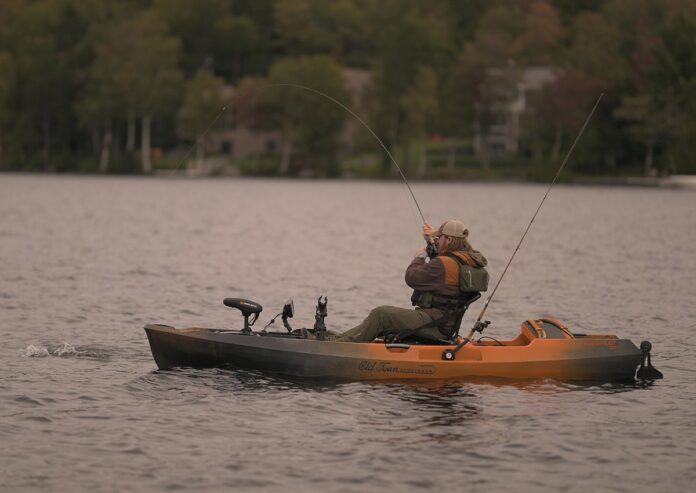We may earn revenue from the products available on this page and participate in affiliate programs. Learn More ›
After spending several days with a couple of registered Maine guides and locals, I learned that tradition and innovation don’t compete against one another for Maine’s hunting and angling culture. Instead, they coexist.
This became apparent as I tested the Old Old Town Sportsman Auto Pilot while trolling Moosehead lake for landlocked salmon using a 6-weight fly rod. Trolling with a fly rod isn’t typical, but this technique remains a staple in the state’s fishing culture, as does Old Town Canoe, which has been churning out watercraft since 1898 in Maine. The AutoPilot 120 takes traditional Maine fishing culture and weds it to the 21st century, an unlikely marriage that uses past success to propel it headfast into the future.
With a deployable 12V Minn Kota motor, hands-free operation, and ample accessory tracks and rod holders, the AutoPilot 120 allows anglers to fish and navigate their kayak with minimal effort. Features anglers across the country can appreciate.
- Weight: 152 pounds
- Total Weight Capacity: 558 pounds
- Dimensions: 12 feet long, 37 inches wide
- Propulsion: Motorized
- 45-pound thrust 12V Minn Kota motor
- Spot-Lock technology
- Foot brace or remote steering
- Four 18-inch accessory tracks
- Extra-large rudder
- Lift assist to deploy or stow motor
- Custom tackle box included
- Universal transducer mount
- Two rear and forward-facing rod holders
Motor
The saltwater-ready 12V Minn Kota makes the AutoPilot 120 one of the best fishing kayaks for enthusiasts and tournament anglers. Operating the motor through the remote is intuitive, and it only took me a few hours to get the hang of it. The responsive motor and extra-large rudder, which deploys at the flip of a switch, turned on a dime.
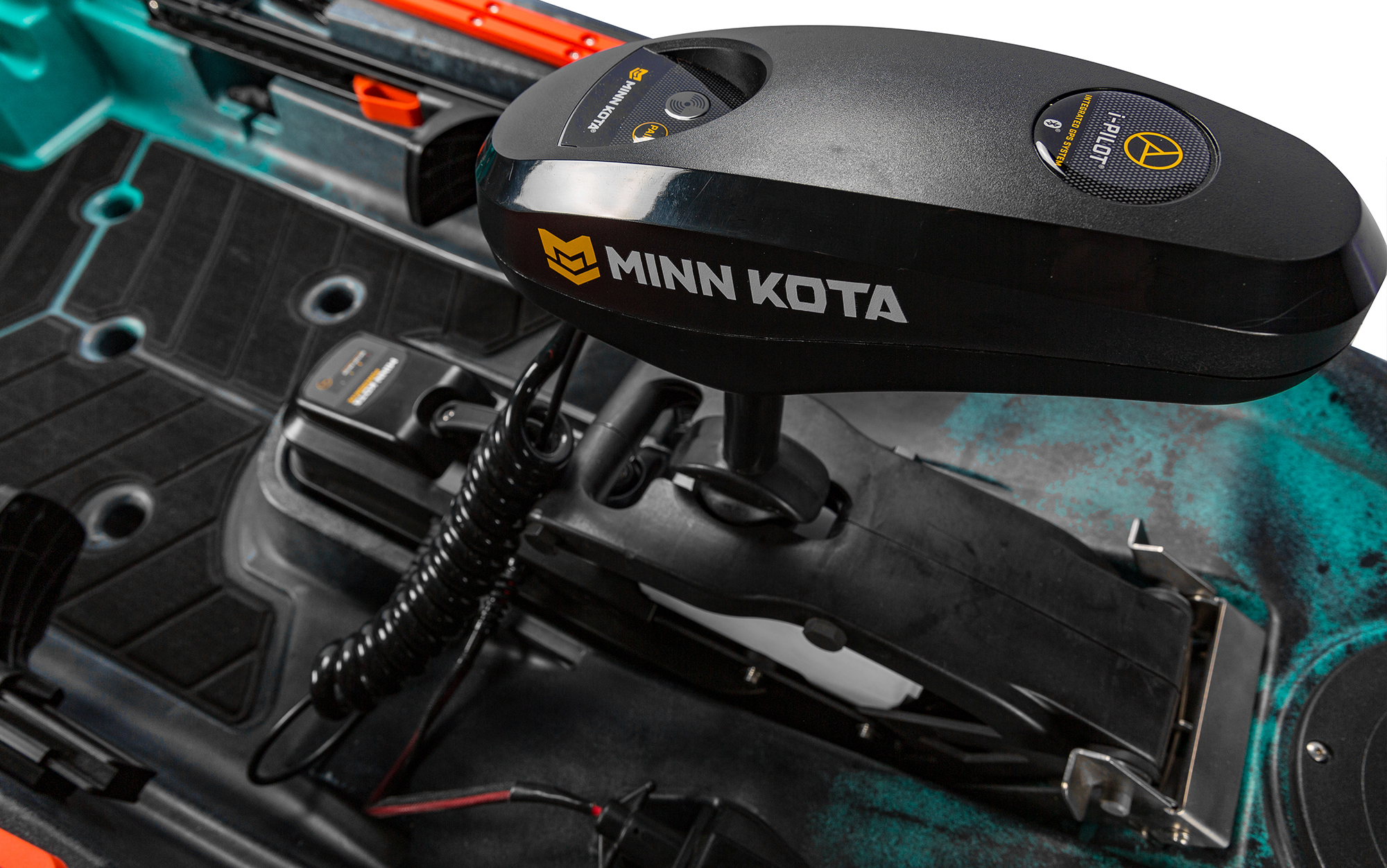
Old Town claims that the Spot-Lock anchors the kayak within a five-yard radius, which I found to be accurate even in chop. Thanks to a simple pull cord, you can easily pull the motor for shallow water or transportation and then quickly deploy it by pulling the cord taut and securing it to the cleat. The motor only weighs 24 pounds, but it does contribute to the kayak’s overall hefty weight.
You’ll have to purchase a trolling motor battery separately. The AutoPilot is compatible with either lead acid or lithium-ion batteries, which conveniently store under the seat in a water-tight box. You get two hours at max speed (around 4 mph). I trolled the AutoPilot at a consistent 2.5 mph for four hours, and it showed no signs of slowing.
Accessories and Storage
Serious anglers will appreciate the storage space and accessory tracks. Four rod holders (two forward, two rear-facing) provide excellent space for those who need multiple rigs at the ready. With two additional rod holders, I ran two trolling rigs (one conventional, one fly rod) and still had plenty of room on the accessory tracks, even with a fish finder.

The AutoPilot’s motor doesn’t just cover water efficiently, it also frees up your hands and space so that you can actually maximize all those accessory tracks. Because I didn’t have to paddle or pedal, I was able to rig lines, make adjustments, eat, and even answer emails while fishing. Even with pedal-driven kayaks, you still have to navigate around pedaling, but the AutoPilot keeps your knees out of the way when you need to make an adjustment or a critical cast.
For tackle, the rear storage offers plenty of space, though accessing it isn’t the easiest, and there’s still a small place in front of your seat for stashing other gear if you need it.
Testing the Old Town Sportsman AutoPilot 120
Thanks to the direction of a couple of registered (and patient) Maine guides, I was able to dabble in Maine’s fly rod trolling in the Old Town AutoPilot. To get the backstory on this trolling method, I spoke with registered Maine guide Christi Holmes, who also joined the fishing trip.
“This traditional method of fishing dates back to the nineteenth century,” Holmes says. “The state marketed itself as an outdoors destination for New Yorkers and other Northeast cities. Just after ice-out, guides would have their sports (clients) hold the fly rod, occasionally bumping the rod while they paddled the canoe. Now, people use more conventional setups, but it’s still efficient to troll with a fly rod.”
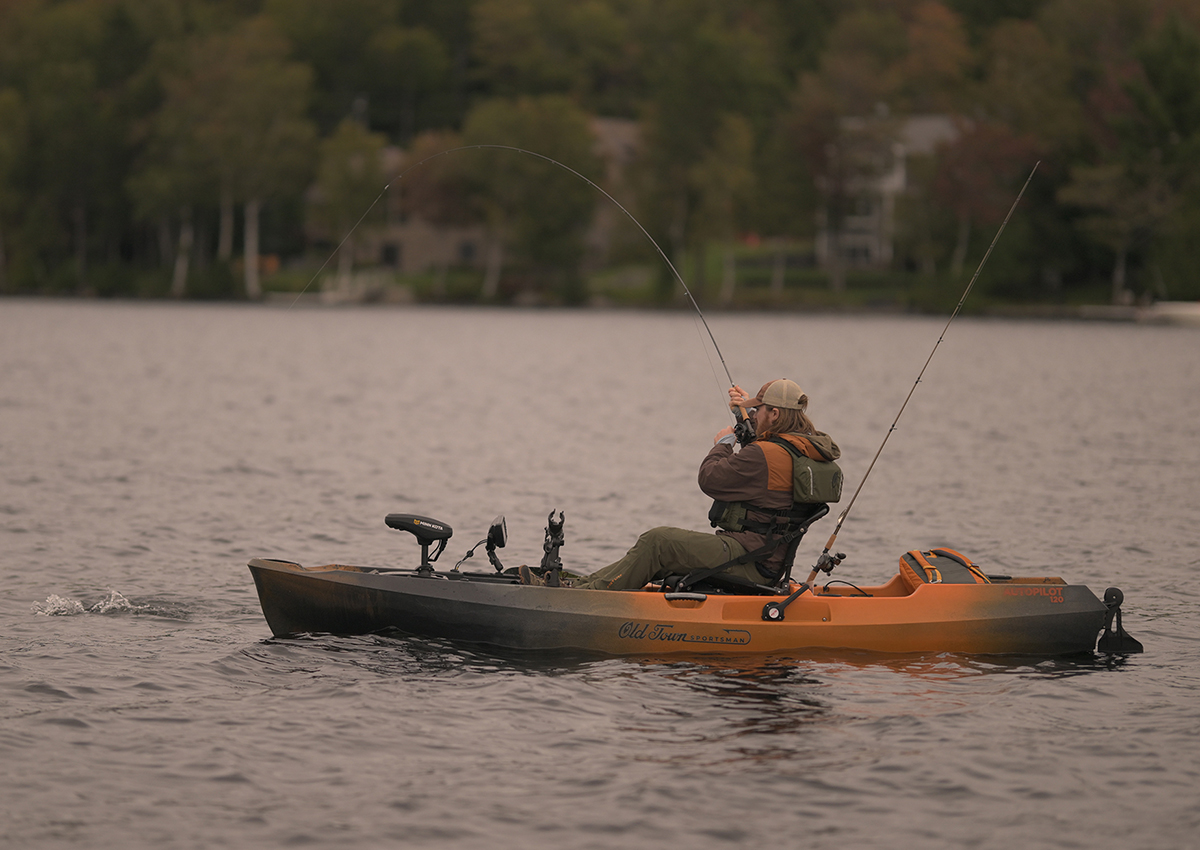

Efficient indeed. While trolling in the Old Town AutoPilot 120, I landed two keeper salmon on the fly rod, a 6-weight Orvis Clearwater rod and reel rigged with sinking line and a streamer that mimics a rainbow smelt. The sinking line, which we stripped all the way out to the backing, gets the streamer down in the water column and far enough away from your kayak that you don’t spook the fish.
If you’re looking for graceful casts and timely hooksets, stick to the tweed. I wasn’t thrilled to be trolling. I much prefer casting or the sense of accomplishment that comes with having a fish take your fly after a tight cast and natural drift. But after having a few salmon eat the streamer and the ensuing fight, I came around to the technique.
It’s hard to argue with the low-risk and high-reward nature of trolling. I learned from Ryan Lilly, Old Town’s brand evangelist and a lifelong angler, that one reason this technique is still wildly popular in the state is that Mainers don’t readily accept change, at least not when something works.
“Mainers would rather carry on a tradition than try something new,” he says. “We’re slower to adopt new technologies because a lot of old methods just work. It’s a mainstay of our personalities. We can be pretty staunch in our ways, which permeates the hunting and fishing culture. It’s both endearing and frustrating.”

It might have taken almost a century for the Maine company to arrive at the AutoPilot, but it was well worth the wait. And thanks to it, no one had to paddle for me while I played the sport and worked the rod, though the AutoPilot did provide a glimpse of this past fishing technique and allowed me to appreciate advancements that make it even easier to perform today. Like the Minn Kota, which did all the work, and the extra rod holder on the front accessory track, which held my Clearwater in the trolling position.
For trolling, the Minn Kota’s remote, which connects via Bluetooth, allows you to set it at your desired speed. You can control the direction through the remote or convenient foot brace steering, which is smooth and responsive. This hands-free operation allows you to focus on casting, and unlike Old Town’s pedal-driven kayaks, there’s nothing to get in your way if you’re rigging, casting, and moving at the same time.
What the Old Town Sportsman AutoPilot 120 Does Best
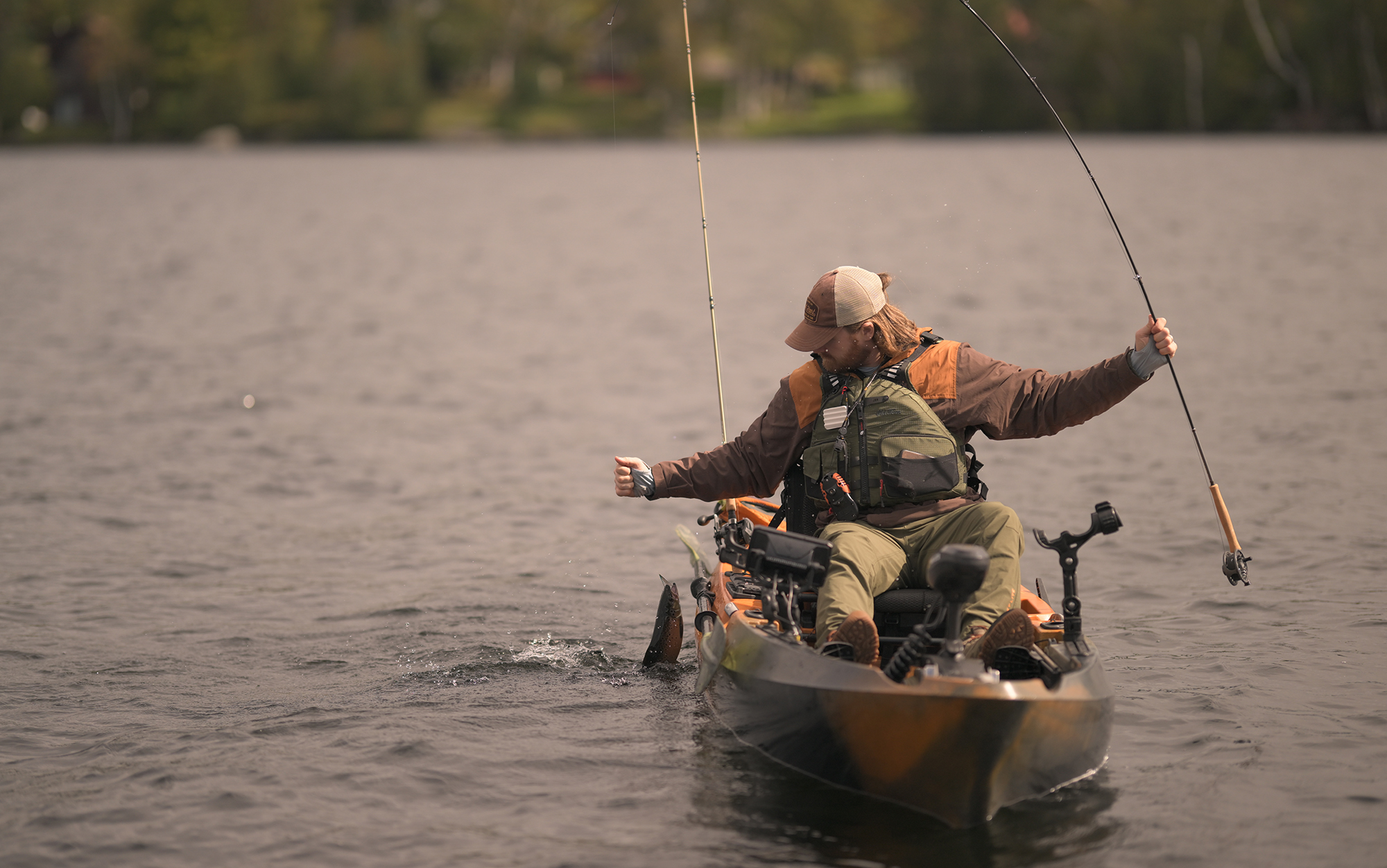
Spot-Lock absolutely makes the AutoPilot 120 a desirable fishing kayak. Staying within a five-yard radius eliminates the headache of trying to steady your kayak when there’s a fish on the line, and you’re trying to navigate shallow waters, structure, etc. This came in handy when I landed fish. I was able to steady the kayak with the press of a button and simply reel. No fighting, backpedaling, or trying to awkwardly steer with one hand, and I didn’t have to worry about drifting in the wake.
The four accessory tracks and universal transducer mounting system are designed for serious anglers. I was able to run two trolling rigs and a Humminbird fish finder and still had plenty of room for other gear and storage.
A fishing kayak is only as good as its seat, and the mesh seat on the AutoPilot is plenty comfortable for all-day fishing trips. It also provides plenty of height, so you’re not sitting with your knees in your chest, and you have a better angle for reeling or spotting fish.
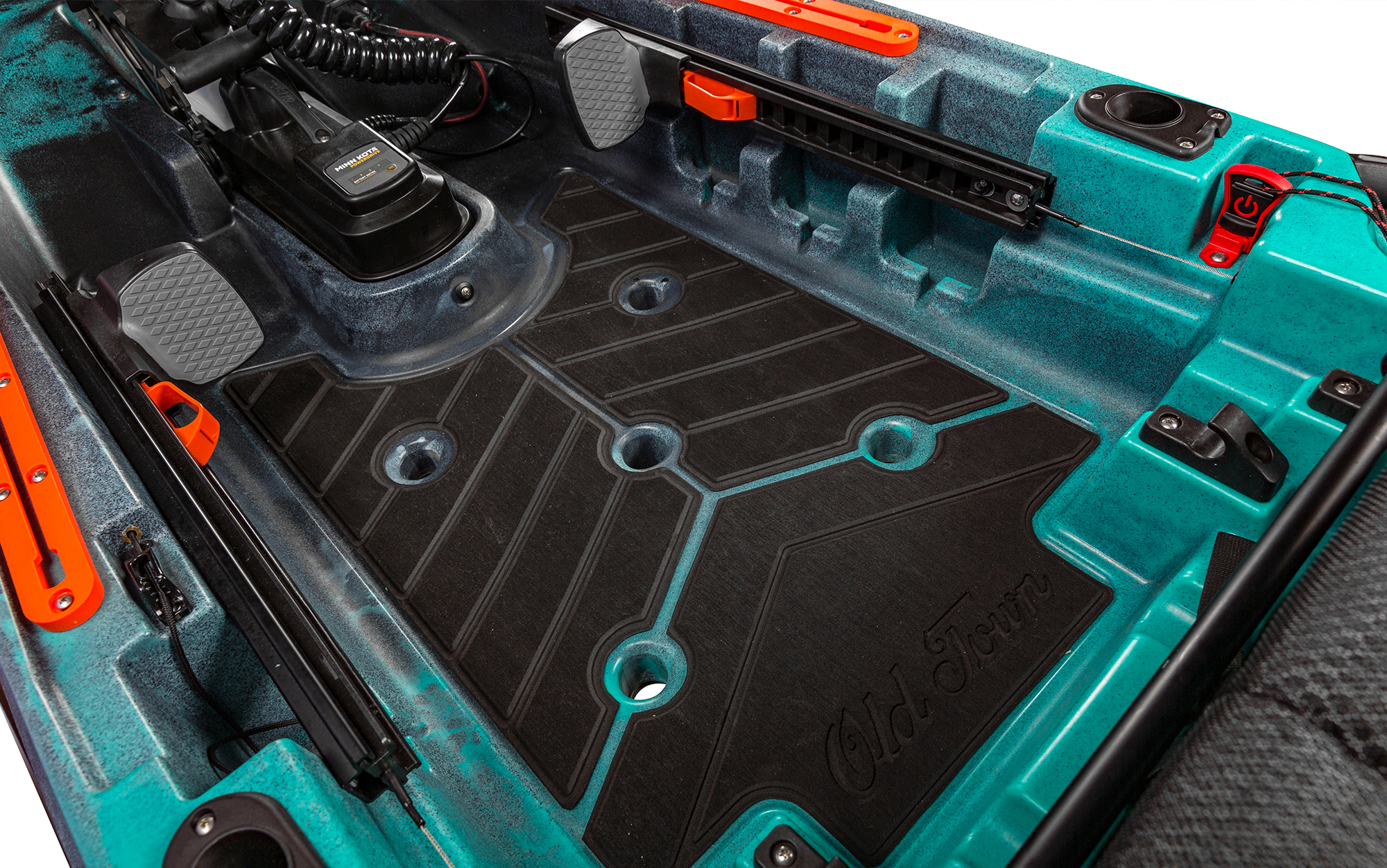
For the times when you’re not sitting, the AutoPilot 120 is rock solid when you need to stand and cast or just switch it up, and the non-slip EVA foam pads are a nice touch. Though subjective, I definitely prefer the overall hull length on the 120, instead of the 136 for hauling purposes.
Perhaps the best (and most obvious) thing about the AutoPilot is the motor. You can cover a lot of ground with minimal effort. As long as you’ve got a solid battery, the autopilot will make your kayak fishing effortless.
While the AutoPilot’s price might give you pause, it does include a lifetime warranty on the hull, should anything happen to it. And when you consider the maneuverability this kayak offers, it does run cheaper than buying an actual boat)—with less maintenance.
What the Old Town Sportsman AutoPilot 120 Does Worst
Price checks the obvious box here. Right around $4,000, the AutoPilot runs almost double the Sportsman PDLs. A lot of anglers will struggle to drop that kind of cash on a fishing kayak. And if you decide to spend that, go ahead and buy a hauling system for AutoPilot as well. At 152 pounds (with motor and other accessories), this kayak won’t be easy to cartop, though it isn’t impossible. It’s much more feasible with a small trailer or a truck bed extender.
While I didn’t have any issues with the battery power, if it does go out, paddling the AutoPilot a significant distance will give you a workout.
Final Thoughts
If you’re a die-hard angler who wants a powered kayak, I can’t think of a better option than the Old Town Sportsman AutoPilot 120. For all its features, accessory capabilities, and technology, the best thing this kayak does is provide more fishing opportunities.
Credit: Source link

















